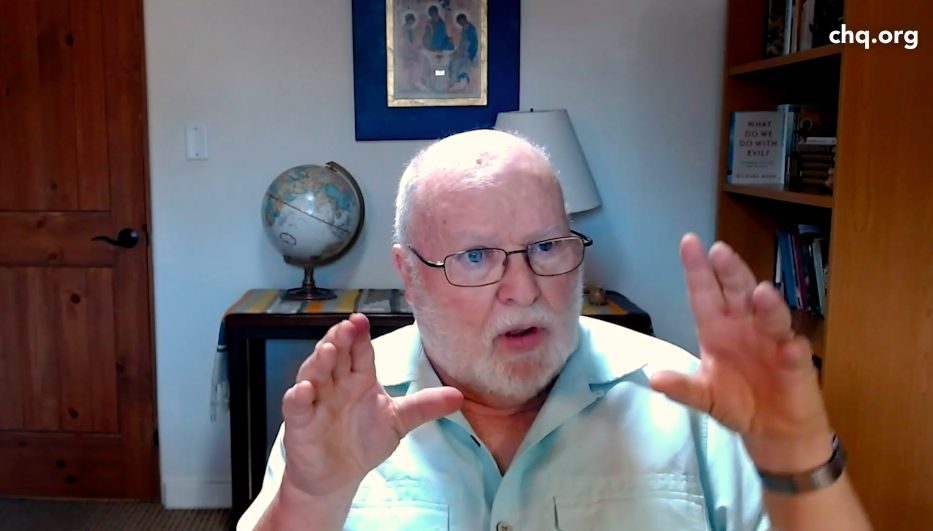
The demonic kind of evil is any system that is above reproach and is too big to fail, Fr. Richard Rohr said in his final Chautauqua lecture of the week. Examples? The penal system, the military-industrial complex, and the Catholic church — the same one that Rohr trained in as a friar.
“Lest we think the corporate and hidden character of sin is still a theoretical issue, we must ask how the seemingly sincere Catholic church was able to reduce and deny and cover up the pedophilia crisis for decades, centuries, despite 2,000 years of moral teaching and formation,” Rohr said, reading from his book, What Do We Do With Evil?: The World, The Flesh, and the Devil.
Rohr gave his lecture on evil originating from the devil at 2 p.m. EDT on Thursday, Aug. 20, on the CHQ Assembly Video Platform. It was the final lecture in Chautauqua’s Week Eight Interfaith Lecture Series theme of “Reframing Our Journey: A Week with Fr. Richard Rohr, OFM.”
Playing off of the term “military-industrial complex,” Rohr said that the devil’s sort of evil is intentionally complex — to the point that people give up on trying to understand it.
The banking system is demonic, for example. Rohr said that to take a loan out used to be enough to excommunicate someone from the Catholic church for profiting off of another person’s poverty. Now, loans are encouraged. And Rohr finds the excess benefits of government workers in the postal system, with paid time off and early retirement while the post office service slows, to be evil.
“Anything above criticism is demonic,” Rohr said.
In terms of evil that can’t be identified, Rohr learned early on in his religious training that no religion has ever thrown out the notion of evil spirits. In Ephesians, Paul called them “spirits in the air that can’t be caught with hands.” Religious art — in the form of faces on the outside of Buddhist temples and gargoyles high above on cathedrals — visualizes evil so humans take it seriously.
Anything that makes people feel powerless in comparison — something is too big, too rich, too in control — has the same characteristics of a demon. Rohr said this also characterizes the government. But people can also be possessed by evil. Jesus exorcised nine demons throughout the New Testament. Rohr said that demon possession is a kind of addiction that makes someone feel unsafe, inferior or endlessly hungry for more.
“The way I’m describing a demon, I think I’ve got three or four of them — and you do too,” Rohr said to his virtual audience.
Rohr said that the highest form of evil is the disguised kind, romanticized to the point of fantasy. It becomes sacred. Rohr gave the example of people still clinging to Confederate statues because the figures are also valued as generals and soldiers. Rohr said the way that the military-industrial complex makes murder legal in war, but not in the streets, is “moral schizophrenia.”
To overcome this kind of evil, a person has to recognize it in “the little worlds we all live in,” Rohr said.
It’s also important to have a healthy suspicion of power.
“Only a small percentage of people know how to handle power gracefully,” Rohr said.
This program is made possible by the Eileen and Warren Martin Lectureship for Emerging Studies in Bible and Theology and the Strnad Family Fund.




